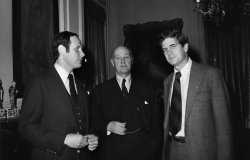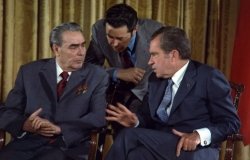Up in Smoke? The Politics and Health Consequences of Tobacco in Today's Russia
"Tobacco is responsible for about 700 deaths a day in Russia, or about 220,000 to 300,000 premature deaths annually, and [according to a World Bank report] is the single most preventable cause of disease and death in Russia," said Judyth Twigg, associate professor of government and public affairs, Virginia Commonwealth University, and former Title VIII-supported short-term scholar, Kennan Institute. Speaking at a 24 February 2008 lecture, Twigg outlined the prevalence of smoking in Russia, and the obstacles in Russian society to antismoking initiatives.
According to the World Health Organization, 70 percent of Russian men and about 25 percent of Russian women smoke. While the smoking rate for men has been relatively stable over the years, the rate for women has nearly doubled since 1992. Much of the rate increase among women has occurred among women in their twenties. Women in urban areas, especially Moscow, are much more likely to smoke than in rural areas, while the rates are roughly the same for men.
In absolute terms, Russian tobacco consumption was the fourth highest in the world in 2005, Twigg said. Consumption in the United States, with over twice Russia's population, ranked fifth. Russians smoke 2,500 cigarettes per capita annually; when corrected for nonsmokers, that rate climes to 4,300, or 240–250 packs per Russian smoker per year. Russians spend at least $15 billion annually on tobacco based on official sales. However, Twigg observed, that number is likely higher because black market or counterfeit cigarettes make up between 25–40 percent of the Russian market. According to survey research, spending on tobacco in most smoking households is roughly 2 percent of monthly spending, with the poorest quintile spending 2.75 percent.
Russia is not yet a signatory to the Framework Convention on Tobacco Control (FCTC), the world's first public health treaty that was enacted in 2005. In July 2007 the Russian Foreign Ministry announced that it would join "soon," Twigg noted, although they still have not yet signed. The Framework calls on member states to ban tobacco advertising, promotion, and sponsorships; requires health warnings on tobacco packaging to cover at least 30 percent of surface area; bans the use of misleading terms such as "light" and "mild;" and protects individuals from exposure to tobacco smoke in workplaces, transport, and public places.
Twigg asserted that there is support for antismoking measures in Russia. Polls in 2007 indicated that a majority of Russians would support smoking bans in public, and 66 percent of Aeroflot passengers would support a smoking ban on flights. The Russian Anti-Tobacco League lobbies the Russian parliament to implement antismoking legislation and strives to raise awareness. Yet official smoking prevention campaigns in Russia are often half-hearted and ineffective, according to Twigg. She pointed out that taxes on tobacco products provide some federal tax revenues and are of vital importance to many regional budgets. In Rostov, 20 percent of the corporate tax collected came from tobacco production. Twigg contended that government regulators are often primarily concerned with controlling illegal sales to cut down on counterfeiting and recapture lost tax revenues.
The Russian tobacco market is dominated by international corporations that are constantly striving to retain their competitive position, according to Twigg. As Russians shifted their preferences from imports to domestic brands, these corporations responded by creating Russian brands. Annual production of cigarettes in Russia doubled as a result between 1996 and 2006 from 206 to 413 billion. The current strategy is to promote more upscale brands to the expanding women and youth consumer markets.
A major obstacle to effective antismoking policy in Russia is tobacco industry marketing and lobbying. The Russian central and regional governments allocate roughly $20 million combined annually to antismoking efforts, but that sum is dwarfed by the industry's investment of over $2 billion in tobacco advertising and marketing in Russia in recent years, Twigg observed. Legislation introduced in the Russian parliament in 2001 that would have regulated the tobacco industry was drastically weakened between its first and second reading, and superseded tougher regional regulations. Twigg cited a tobacco industry journal report in 1998 summarizing the promise of the Russian market: "Anti-tobacco activists are almost unknown in Russia, so the Russian people and government have not been bombarded with anti-tobacco propaganda."
"Smokers are reliant almost exclusively on their doctors for help in quitting smoking," Twigg stated. Yet surveys show that the smoking rate among physicians mirrors or exceeds that of the general population, and fewer than 10 percent of physicians are aware of all of tobacco's adverse health effects. Most physicians lack the skills to counsel cessation, and most think such advice would be ineffective.
"The hopeful sign right now is that Putin has spoken out on the issue," Twigg concluded. "Putin is not a smoker and the Kremlin appears now to have put its weight behind these kinds of regulatory and legislative changes that could actually have some enforcement teeth behind them. Until that happens, the public health of Russians is going to continue to be threatened by this completely avoidable cause of premature mortality."
About the Author


Kennan Institute
The Kennan Institute is the premier US center for advanced research on Eurasia and the oldest and largest regional program at the Woodrow Wilson International Center for Scholars. The Kennan Institute is committed to improving American understanding of Russia, Ukraine, Central Asia, the South Caucasus, and the surrounding region though research and exchange. Read more











